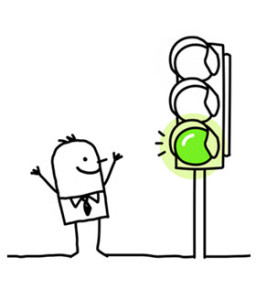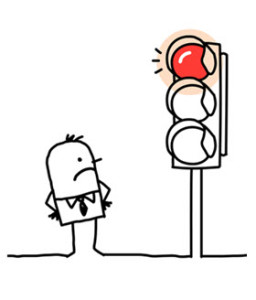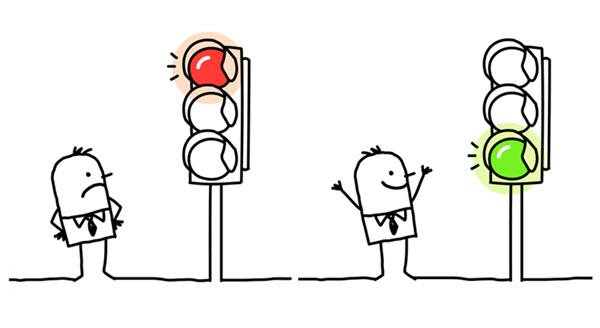It was the third morning in a row of irritating errands. I was rushed, stressed, distracted, and running late. When it seemed like I was hitting every light just as it turned red, I could feel my grip on the steering wheel tighten, my patience level drop another notch, and flashes of fury flare… at the world in general.
Nah. Not my thing. And I’m fairly skilled at talking myself down from this sort of excessive emotion. But I did need to do just that. And a sense of taking it personally? Of “even this, not going my way” during a bad week?
Yup. Definitely. Until… something in me knew to raise my eyes to a patch of clear blue summer sky, and I took a breath. Then another. Then another, as the light changed, and I eased my foot off the brake and onto the accelerator.
Then came relief after stopping on an errand, getting back on the road, and at the next few intersections, it was uninterrupted driving — at last, a series of green lights.
Red light, green light. We are, naturally, subject to both. So why is it that we feel the intensity of the one that seems to present an obstacle?
Murphy’s Law
Of course, it appears as if the instances of roadblocks and detours and even full stops, albeit temporary, come at the worst possible times. You know. Murphy’s Law in extremis, and occasionally with serious impacts, if timing is critical.
Try this example on for size: You allow twice the time you need to get to a job interview, but a traffic snarl brings you to a screeching halt for two hours, and even if you’re lucky enough to be seen when you arrive, the negative impression is irrevocable.
More Murphy’s Law examples? Believe me I have plenty, and I imagine you do, too.
 Now, I have read articles that remind me how the human mind plays (dirty) tricks. We are wired to retain the difficulties and negative experiences differently and than those that pass pleasantly and somewhat unnoticed.
Now, I have read articles that remind me how the human mind plays (dirty) tricks. We are wired to retain the difficulties and negative experiences differently and than those that pass pleasantly and somewhat unnoticed.
Memory’s “negativity bias” has both physiological amd psychological origins as this New York Times article explains:
… Negative emotions generally involve more thinking, and the information is processed more thoroughly than positive ones… Thus, we tend to ruminate more about unpleasant events — and use stronger words to describe them…
And it seems to me that when several things are going wrong simultaneously, we are also prone to anticipate that this is all we can expect in the future. So we brace ourselves for the onslaught, and imagine some situations to be worse than they actually are.
Perception, Reality, Coping Skills
Over the years, I have come to expect delays — not only in city traffic, but in general, in life. As is usual with maturity, I have acquired the capacity to understand the influences of attitude and perception on both behavior and outcomes, and to acknowledge the existence of a diversity of views in any scenario. In a complex and frightening world, I hope I have acquired the perspective to see small problems as precisely that.
And, I have developed coping skills.
What kind of coping skills?
Oh, little tricks like talking myself down from pointless consternation over red lights, like asking myself “what’s the worst that can happen” and then answering realistically, like reminding myself that I am more emotional on days when I haven’t slept enough, like cutting myself a little slack when I’m under stress and make dumb mistakes. Sure, I chide myself when this happens, but not as unkindly as I did when I was younger.
I remind myself that whatever just occurred that has me irked, it isn’t the end of the world and I’m not alone in my frailty or overwhelm. And if I’ve hurt or offended someone else in my wake, then I do my best to make amends.
My life experience is such that the blissful ignorance of youth has morphed into an adult reality check, which advises moderated optimism, caution in trusting good things of a certain sort, and plenty of contingency planning… for my contingency planning.
This approach is a far cry from seeing the world only in shadow. While most of us endure periods when the shadows are ominous indeed, it’s wise to recognize that for all the stumbles and snarl-ups and yes, hitting every red light on every errand on each consecutive day when you’re running late, there will be other hours and days and weeks when the stream of green lights (and good moments) will be so “normal” that you will hardly seem to notice.
You May Also Enjoy


Ah yes, your post takes me back to my twenties, and always, always being almost late for everything. Cutting my time so fine that I couldn’t afford a traffic jam or even too many red lights… and then getting more and more frustrated when they inevitably DID happen. Sigh. Not anymore.
Nowadays I take with me a thermo cup of cold water, a travel mug of tea, switch on CBC radio (public radio here in Canada) and just enjoy whichever fascinatingly intelligent show happens to be on air. I told my husband the other day that I think CBC radio has made me smarter… and most of that listening is due to sitting in traffic. Now…. I don’t know what would happen if all that water and tea made an urgent call of nature imminent. 🙂
Chuckling at your mention of the call of nature, Sue. ?
Thank you for this reminder. I know all of this stuff. But in the heat of moving (and I literally mean the hot, humid 90-degree kind) it is easy to become impatient, even enraged at obstacles. Next time I feel that way, thanks to your wise post, I will remember to look up at the blue, blue sky, breathe, and be grateful.
Ugh. Moving in that kind of heat, Judith. The very thought is enough to put one over the edge! These days I am trying to remind myself of the soothing impact of any element of nature – from the color of the sky (while I’m stuck in traffic), to the wildflowers on a highway median strip (while I’m stuck in traffic), to the extraordinary wingspan or wing “wiggle” of a bird in flight overhead (yup, stuck in traffic).
It does seem to assist with achieving perspective. 🙂
Yes to this regarding individual setbacks or frustrations, but how to recover and regain hope in light of the pervasive grief and hopelessness inflicted by the violent atrocities committed by some of our fellow human beings?
I hear you, Leslie. And I don’t know, except to try to live a decent life, love fiercely, and do a little good if I can.
The grief is indeed pervasive.
I can definitely relate ladies. I remember driving a lot when I was in my 30’s, and it was not a pretty site. I would get road rage quicker and quicker each time. I had gotten to the point where I dreaded going out the door to sit in traffic, just one more time. I had enough, my solution was to take public transportation, and walk. I feel a lot better, but I do miss the comfort of being in charge of when I get to my destination. Well sorta kinda :).